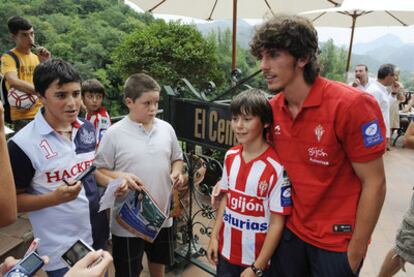"Soccer is rotten"
Javi Poves, a Sporting Gijón defender, has quit the sport at the age of 24
Javi Poves could have continued earning a living in soccer, earning a higher income than the majority of people of his age. However, last week, at the age of 24, Poves decided to harmonize his ideals and his lifestyle.
The Sporting Gijón central defender played two seasons in Segunda División B with the club's youth side and made his debut in Primera División on the final match day of last season. A promising moment in his career, one might think. Now he has elected to resolve the contradictions between his work and his private life: "What is the point in earning 1,000 euros instead of 800 if I know that it has come through the suffering of many other people?"
A handful of oddities gave those around Poves clues to the basis of his decision. His teammates were surprised at how he would amuse himself at training camps and on team journeys by reading Karl Marx's Das Kapital, or Adolf Hitler's Mein Kampf - hardly standard fare in the world of professional soccer players. In Sporting's administrative offices eyebrows were also raised when Poves asked that the club cease to send his salary by money transfer so that the bank could not use it in speculative ways. He also returned the keys to a vehicle provided by a commercial company to Sporting's first team players, saying that his own Smart car was perfectly sufficient.
Teammates were surprised to see him reading Das Kapital and Mein Kampf
"The problem is you are either right or you are left. I'm neither"
Declarations made by Poves to leading Asturian daily La Nueva España in June, when the 15-M protest movement was at its height, gave an indication of his imminent retirement from the sport. It had little to do with his ostracism from the first team plans of Sporting coach Manuel Preciado, who only gave Poves 10 minutes of field time last season. He had a year left on his contract but his interview made plain that he was already saying farewell: "When I was young I played for the love of the game but the more you get to know how soccer works, the more you notice it is all about money, that's its rotten, and it takes away a little of the sheen."
Unlike the protestors who took to Spain's streets in May, Poves does not advocate the peaceful path to confronting the system. "Instead of so much 15-M and so much bullshit, what needs to be done is to go the banks and burn them, chop heads off. The luck of this part of the world is the misfortune of the rest," he wrote on Lainformacion.com when announcing his retirement.
Neither did Poves change his view of the 15-M protest after speaking to activists in Gijón's main square. "It's a movement created on purpose by the media to channel this social malaise and ensure that this spark does not become dangerous and uncontrollable for the system. It's a facelift for the capitalist system but not a radical change."
In July, while his teammates were in pre-season training, Poves signed the termination of his contract. He could have carried on playing but decided to return to studying history through the UNED distance-learning university. "I don't have my viewpoint defined yet," he said. "I want to read a lot and find out about everything."
"I guess you'd call me anti-system," said Poves of his ideology. "The problem is you are either right or you are left. I'm neither. I am against all of that." Now he is facing a new reality without the cushion of regular income: "I want to get to know the world for real, to see what is out there, go to Africa. You don't need much money for that. In Turkey I stayed in three-euro hotels. I don't want to live like a prostitute, like 99 percent of people. If I can't live a clean life in Spain, I'll find one in Myanmar, or wherever."

Tu suscripción se está usando en otro dispositivo
¿Quieres añadir otro usuario a tu suscripción?
Si continúas leyendo en este dispositivo, no se podrá leer en el otro.
FlechaTu suscripción se está usando en otro dispositivo y solo puedes acceder a EL PAÍS desde un dispositivo a la vez.
Si quieres compartir tu cuenta, cambia tu suscripción a la modalidad Premium, así podrás añadir otro usuario. Cada uno accederá con su propia cuenta de email, lo que os permitirá personalizar vuestra experiencia en EL PAÍS.
¿Tienes una suscripción de empresa? Accede aquí para contratar más cuentas.
En el caso de no saber quién está usando tu cuenta, te recomendamos cambiar tu contraseña aquí.
Si decides continuar compartiendo tu cuenta, este mensaje se mostrará en tu dispositivo y en el de la otra persona que está usando tu cuenta de forma indefinida, afectando a tu experiencia de lectura. Puedes consultar aquí los términos y condiciones de la suscripción digital.








































